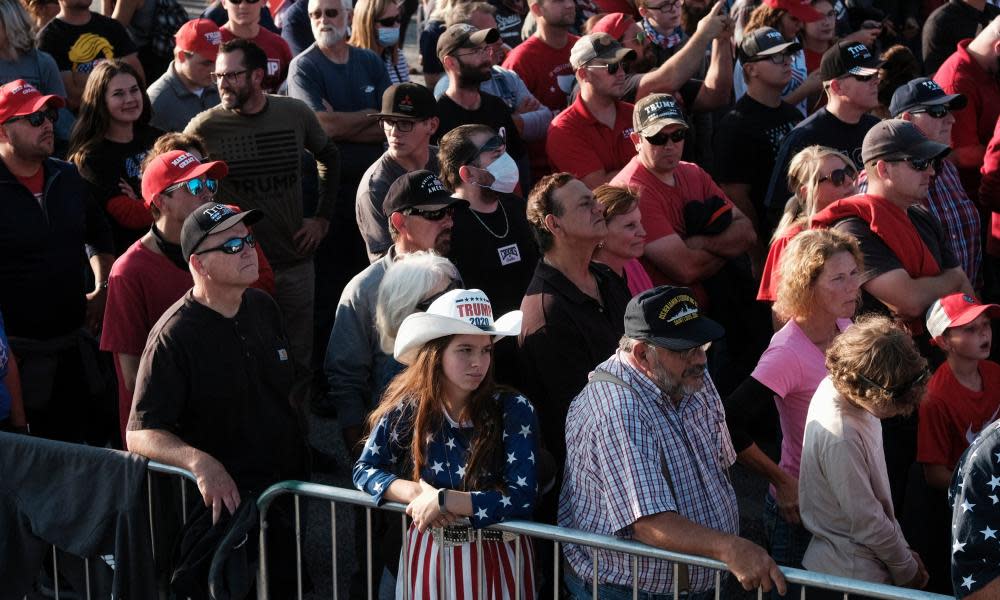Global report: Trump wrongly claims Covid affects 'virtually' no young people

As the United States’ coronavirus death toll edged closer to 200,000, US president Donald Trump claimed falsely at a rally in Ohio that the country’s fatality rate was “among the lowest in the world” and that the virus has “virtually” no effect on young people.
Speaking in the town of Swanton, Trump said: “It affects elderly people. Elderly people with heart problems and other problems. If they have other problems that’s what it really affects, that’s it,” he claimed. “You know in some states, thousands of people – nobody young.”
“Take your hat off to the young, because they have a hell of an immune system. But it affects virtually nobody. It’s an amazing thing. By the way, open your schools.”
Related: Coronavirus map of the US: latest cases state by state
Trump also claimed that the United States had “among the lowest case-fatality rates of any country in the world.” The US ranks 53rd highest out of 195 countries in the world with a case-fatality rate of 2.9%, according to Johns Hopkins University. It is the 11th worst on deaths per 100,000 people, at 60.98.
At least 199,815 Americans are known to have died since the start of the pandemic, according to Johns Hopkins, which relies on official government data. With the worst death toll in the world, the US accounts for one in five coronavirus-related fatalities worldwide. Just under one in every 1,600 Americans has died in the pandemic.
In August, the World Health Organization warned that young people were becoming the primary drivers of the spread of coronavirus in many countries.
Meanwhile, in Europe, stocks posted their worst fall in three months on Monday as fears of a second wave hit travel and leisure shares, while banks tumbled on reports of about $2tn-worth of potentially suspect transfers by leading lenders.
Pubs, bars and restaurants in England will have to shut by 10pm from Thursday under new nationwide restrictions to halt an “exponential” rise in coronavirus cases.
Boris Johnson is expected to make an address to the nation on Tuesday setting out the new measures. With cases doubling every week across the UK and a second wave expected to last up to six months, health officials are said to have advised the government over the weekend to “move hard and fast”. There could be up to 50,000 new coronavirus cases a day in Britain by the middle of October if the pandemic continues at its current pace, the country’s chief scientific adviser warned.
Scotland is also expected to announce new restrictions on Tuesday.
The Czech Republic prime minister, Andrej Babis, admitted on Monday that his government had made a mistake when it eased restrictions over the summer. “Even I got carried away by the coming summer and the general mood. That was a mistake I don’t want to make again,” the billionaire populist said in a televised speech.
After fending off much of the pandemic earlier in the year with timely steps, including mandatory face masks outdoors, the government lifted most measures before the summer holidays.
The Czech Republic registered a record high of 3,130 coronavirus cases on Thursday last week, almost matching the total for the whole of March, although testing capacity was low at the start of the pandemic.
In other developments:
There are 31.2m coronavirus cases worldwide, according to Johns Hopkins, and 963,068 people have died over the course of the pandemic so far.
New Zealand recorded no new cases of Covid-19 on Tuesday, as restrictions on much of the country were entirely removed, and measures imposed on Auckland, the largest city, were due to ease further. There was no recorded community spread of the virus in the rest of New Zealand, where the government has now lifted all physical distancing restrictions and limits on gatherings.
Mexico surpassed 700,000 confirmed cases on Monday after the health ministry reported 2,917 new confirmed cases in the Latin American country, bringing the total to 700,580 as well as a cumulative death toll of 73,697.


